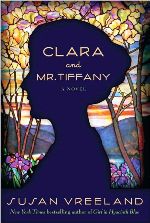Susan Vreeland is the bestselling author of several historical novels about some of the most prestigious works of art in history. Combining heavy research with natural storytelling grace, Vreeland often recreates the worlds of artists and the relationships that inspired them. She's reimagined the lives of Renoir (Luncheon at the Boating Party and Vermeer (Girl in Hyacinth Blue) and now investigates artist/designer Louis Comfort Tiffany in Clara and Mr. Tiffany, which is in stores now.
 I came to write Clara and Mr. Tiffany through a chain of events that I believe were not coincidences. Clara Driscoll was virtually unknown for a century because Louis Comfort Tiffany did not publicize the names of his designers. If it weren't for the Victorian zest for writing voluminous letters, she would be only a footnote in the history of decorative arts. However, thanks to her spirited letter writing about her life in Manhattan working for Tiffany Studios, we know her as artist and woman.
I came to write Clara and Mr. Tiffany through a chain of events that I believe were not coincidences. Clara Driscoll was virtually unknown for a century because Louis Comfort Tiffany did not publicize the names of his designers. If it weren't for the Victorian zest for writing voluminous letters, she would be only a footnote in the history of decorative arts. However, thanks to her spirited letter writing about her life in Manhattan working for Tiffany Studios, we know her as artist and woman.
In 2005, two art historians specializing in Tiffany learned of the letters, read them, realized their importance, and contacted New York Historical Society which owned more than 130 Tiffany lamps. The curator of decorative arts there agreed that what the letters revealed should be made public. Together they mounted an exhibition in 2007, A New Light on Tiffany: Clara Driscoll and the Tiffany Girls, in which Clara was hailed as "a gifted unsung artist," and "the hidden genius behind many of Louis C. Tiffany's designs." This startling discovery rocked the art world.
That was the exhibition that inspired this novel. Poring over hundreds of letters, I discovered the wry, lively, sometimes rhapsodic voice of a freethinking, intensely curious woman who adored grand opera but was just as moved by the tiny dramas and tragedies of the immigrant girls she hired to make the lamps she designed. She followed the politics of the day even though she couldn't vote, and threw herself into the crush of Manhattan life, witnessing the advent of electric street lights, telephones, skyscrapers, the subway, and the whole sweep of events that catapulted New York into being the cultural capital of the world. She was caught up in the Gilded Age uptown as well as the immigrant poverty of the Lower East Side. Plenty of material here for a historical novel.
In choosing a topic for my fiction, I always ask whether the story can offer something of substance beyond the story line --- something of universal relevance or something that allows me to express my own sensibilities Yes, it did. I rubbed my hands together in glee.
The act of rendering Clara's story taught me that there are more types of beauty than just the sensual beauties that Tiffany spoke of when he wrote, "Beauty is what Nature has lavished upon us as a Supreme Gift." There is also the beauty of instinctive acts of generosity and caring, as evidenced by Edwin leaping off the streetcar to tell the Russian woman of the job he found for her son. There is the beauty of Clara's compassion for Julia and Olga, Polish immigrants leading hard-scrabble lives. There is the beauty of non-judgmental tolerance, as evidenced in her friendships with four gay men. In the last analysis, these beauties may be more profoundly important than the beauties of the visible world. As you discuss the novel, consider what Clara's story taught you about beauty or life or love or our collective cultural history. Isn't that the best way to get the most out of a book?
Your homes are probably filled with books. Some homes haven't a single one. You know the power of healing or inspiration that can come from the right book at the right time. Some people have never experienced that. I'm wondering whether you and your book club would take on this challenge: Choose a person whom you think is not a reader of fiction. It may be the checker in the grocery line, the clerk at the post office, your bank teller. You only have to know the person well enough to deduce what kind of novel might appeal, might open that life to reading. Give that person a book. It doesn't have to be a new book, but it does have to be a carefully selected book. Give it on an ordinary day, not a holiday or birthday. You will be doing your part to counteract the decline of reading in America, and to stimulate the imagination. Without imagining other lives, cultures, and time periods, we don't have the capacity for compassion and human understanding --- the absence of which leads to conflict, violence, wars. Literature is an antidote to that. Each time a person enters the life of another through the imagination, it is a small step upward in the elevation of humanity. You have a vital role to play.







